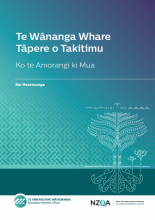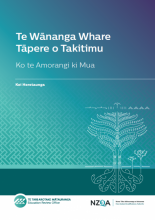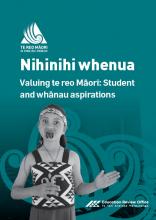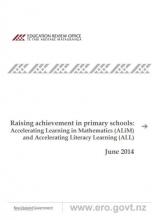- Topics: Engagement, Mathematics Support Teachers (MST), Te Pou Mataaho | Evaluation and Research Māori, Te Rūnanga Nui o ngā Kura Kaupapa Māori o Aotearoa
- Published: 08 Jul 2021
Te Kura Huanui : Ko ngā kura o ngā ara angitu
I roto i Te Kura Huanui: Ko ngā kura o ngā ara angitu, ko ngā uiui me ngā whānau Māori, kaiārahi, kaiako, kaimahi, kaumātua hoki e tūhura ana i te ngākau titikaha o ngā hapori ki te whakarauora, ki te whakapakari hoki i te reo Māori me ngā tikanga Māori mō ā rātou mokopuna, tamariki, uri whakatupu anō hoki.
- Published: 08 Jul 2021
Te Kura Huanui: The treasures of successful pathways
Te Kura Huanui: The treasures of successful pathways and supporting documentaries explore the Māori-medium education pathway, through a rich collection of interviews and research conducted in partnership with early founders, whānau, leaders, graduates, kaiako, kaimahi and kaumatua.
- Published: 19 Jan 2021
Learning in a Covid-19 World: Supporting Secondary School Engagement
This report explains strategies for supporting secondary students’ engagement during the Covid‑19 pandemic. These strategies include re-engaging students who present with wellbeing concerns or show signs of disengagement. The report also includes some innovative actions schools used to promote student engagement after the first lockdown in 2020.
- Published: 19 Jan 2021
Te Kahu Whakahaumaru – Ngā mahi a te rangai mātauranga Māori (English)
Te Pou Mataaho, ERO’s evaluation and research group, and Te Uepū ā Motu, ERO’s national evaluation and review team, pursued this evaluation to provide an evidence base about the initial impacts of Covid-19 on Māori-medium education and how the sector responded.
- Published: 19 Jan 2021
Te Kahu Whakahaumaru – Ngā mahi a te rangai mātauranga Māori (Māori)
I whāia tēnei arotake e Te Pou Mataaho, te rōpū arotake, rangahau hoki a Te Tari Arotake Mātauranga me Te Uepū ā-Motu, te rōpū arotake ā-motu a Te Tari Arotake Mātauranga, ki te whakaputa i tētahi kohinga taunakitanga e kitea ai ngā pānga tōmua o te Mate Korona ki te rāngai mātauranga reo Māori, me ngā rautaki i whāia ai e taua rāngai.
- Published: 10 Dec 2020
Te Kahu Whakahaumaru: Māori continue to show resilience across Māori-medium education
In Aotearoa, Māori-medium education experienced significant disruption when the outbreak of Covid-19 forced kura to close their doors, and whānau and kaiako to adjust to home schooling and distance learning. Among the many challenges were access to technology and resources with Māori communities among the most affected.
- Published: 10 Dec 2020
E whakatinana tonu nei te rāngai mātauranga reo Māori i te manawanui
I Aotearoa nei, i tino raru te rāngai mātauranga reo Māori i te horapatanga o te Mate Korona, i kati ai ngā tatau o ngā kura, i mate ai hoki ngā whānau me ngā kaiako ki te tīni i ā rātou mahi ki te whakaako ki te kāinga me te ako tawhiti.
Ko tētahi raru i roto i te huhua, ko te korenga o ngā taputapu matihiko me ngā rauemi, ka mutu ko ngā hapori Māori ērā i rongo i te korekore rawa atu nei.
- Published: 15 Sep 2020
Nihinihi Whenua – Valuing te reo Māori: Student and whānau aspirations
This report provides a snapshot of student and whānau perspectives on the teaching of te reo Māori. It follows the June publication of Te Tāmata Huaroa, which provides a review of the current status of te reo Māori in English medium school settings.
- Published: 18 Jun 2020
Te Tāmata Huaroa: Te Reo Māori in English-medium Schooling
This report gives a snapshot of the current provision of te reo Māori teaching and learning in a representative sample of English-medium primary and secondary schools. The education sector is seen as an important lever in the Government’s Maihi Karauna strategy for language revitalisation.
- Published: 11 Jun 2019
Keeping children engaged and achieving in writing
This report shares some of the strategies and approaches used by schools who had focused on improving achievement in writing. It also shares some simple strategies used in classrooms where achievement in writing had been accelerated.
- Published: 29 Nov 2018
Keeping children engaged and achieving through rich curriculum inquiries
This Education Review Office (ERO) report is one of a series of reports on teaching strategies that work. It features strategies and approaches that we observed in 40 primary schools selected from across New Zealand. These schools came from a database of 129 schools, all with rolls of 200 or more, in which the proportion of students in the upper primary years (Years 5 to 8) achieving at or above the expected standard had increased. In each case, achievement levels were also above average for the decile.
- Published: 14 May 2018
Teaching strategies that work - Reading
The Education Review Office (ERO) has released the latest in its Teaching Strategies that Work series. “Keeping children engaged and achieving in reading” is a description of strategies used by primary schools which have significantly improved their students’ achievement in reading.
- Published: 20 Feb 2018
Teaching strategies that work - Mathematics
This Education Review Office (ERO) report is one of a series of reports on teaching strategies that work. It features strategies and approaches that we observed in 40 primary schools selected from across New Zealand. These schools came from a database of 129 schools, all with rolls of 200 or more, in which the proportion of students in the upper primary years (Years 5 to 8) achieving at or above the national standard had increased. In each case achievement levels were also above average for the decile.
- Published: 26 Jun 2014
Raising achievement in primary schools ALiM and ALL
This national report is a companion report to Raising achievement in primary schools. It presents further findings of how some of the primary schools were using the Ministry-funded support projects - Accelerated Learning in Mathematics (ALiM) and Accelerated Learninig in Literacy (ALL) to accelerate progress and raise achievement.
- Published: 01 May 2011
Education on the East Coast: Schools and Kura Kaupapa Māori
This cluster evaluation highlights improvements in the overall performance of the six kura kaupapa Māori and 12 English-medium schools on the North Island’s East Coast. This report highlights some significant changes in these schools over the last 14 years.
- Published: 01 Sep 2008
Partners in Learning: Good Practice
This report complements ERO’s major evaluation, Partners in Learning: Schools’ Engagement with Parents, Whānau and Communities, published in May 2008. It presents case studies of eight schools, identified during ERO reviews, that were successful in engaging with their parents, whānau and the wider community. The report also discusses key factors that contribute to the success of this engagement.











